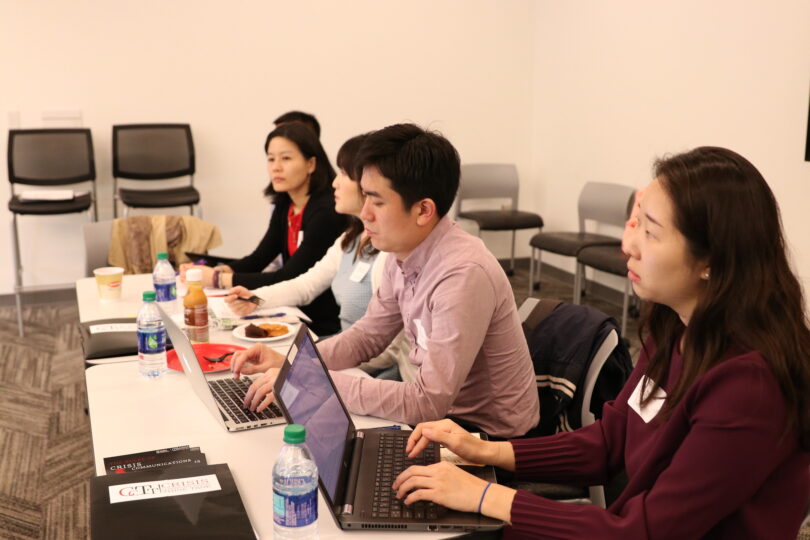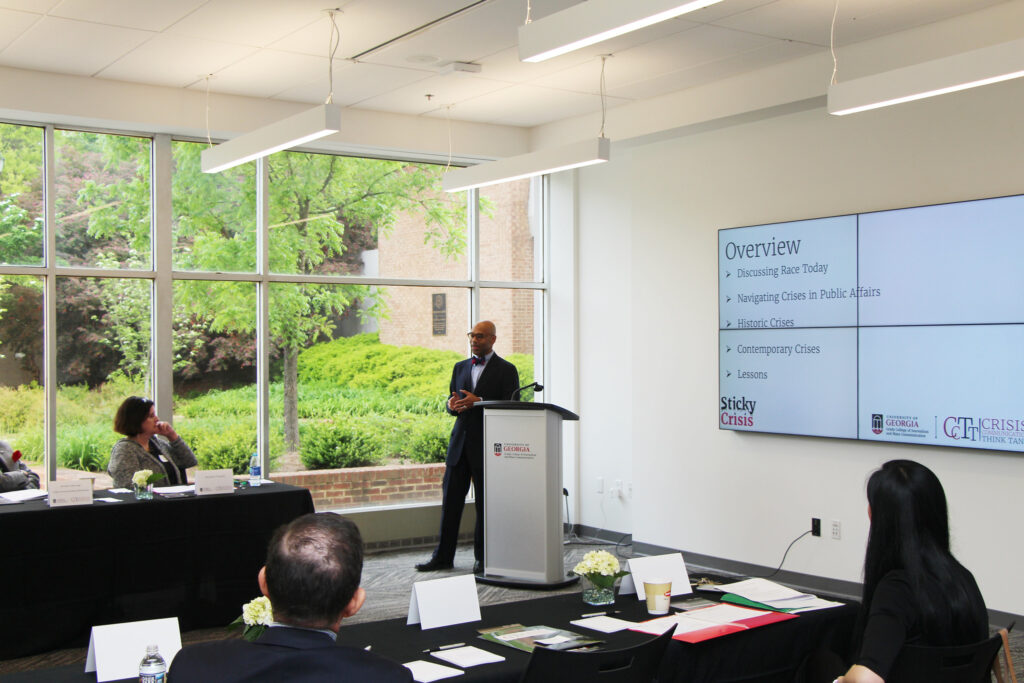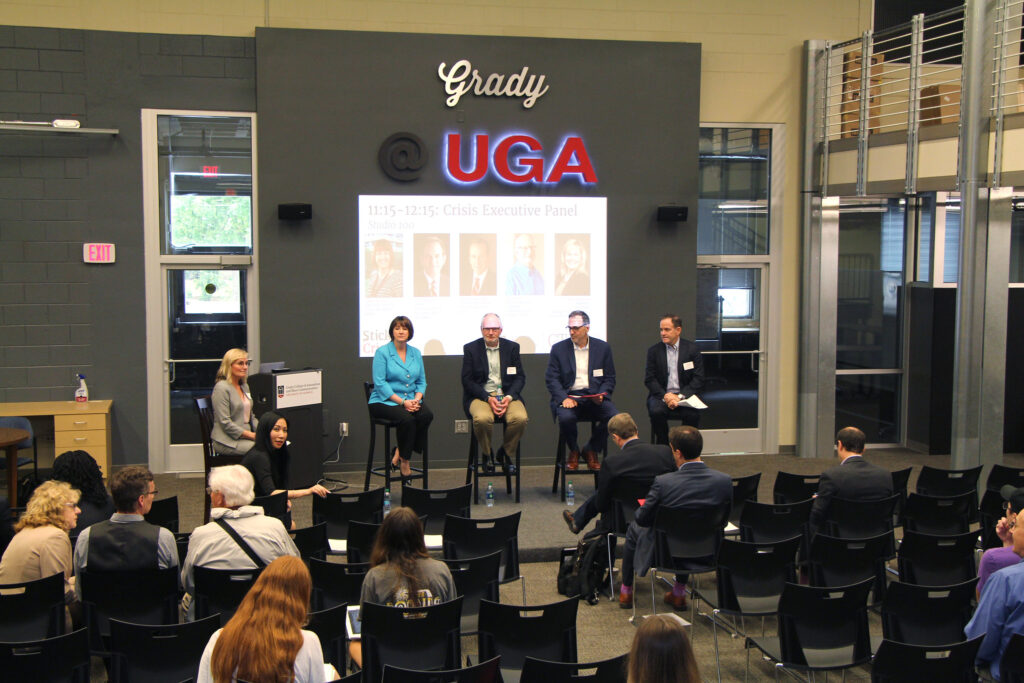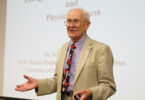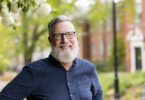Crisis communication is one of the biggest challenges facing public relations professionals, but until very recently there were few opportunities for undergraduate and graduate students to learn the practical lessons of this increasingly important specialty in an academic setting.
Now, thanks to a unique program at the University of Georgia, industry practitioners and academic scholars are collaborating to address emerging topics and provide insight for navigating these difficult situations.
The Crisis Communication Think Tank, hosted by the Grady College of Journalism and Mass Communication, is one of the few PR programs to create a collaboration of practitioners and academics focused on crisis communication topics. Members of the CCTT collaborated in person at Grady College on April 14 to discuss this year’s theme, Power of People.
“When we sit down at the same table, we talk about issues and unpack the value of what we do for practitioners,” said Yan Jin, University of Georgia Athletic Association Professor in Grady College and co-founder of the CCTT. “We find out from them what research questions are most important. And, in turn, it’s very enriching to see practitioners utilize the theory-based research insights we develop to inform their practice in a meaningful way.”
The CCTT is supported by the Crisis Communication Coalition, a Grady College program dedicated to providing research for crisis communication professionals, resources for journalists and education for students. In addition to Jin, other CCTT co-founders include Bryan Reber, the C. Richard Yarbrough Professor in Crisis Communication Leadership and head of the department of advertising and public relations, and Glen Nowak, associate dean for graduate studies and research and co-director of the Center for Health & Risk Communication.
“Crisis communication is an ever-growing and nuanced topic, whether you are just learning about it as public relations student or a seasoned professional who deals with crisis on a regular basis,” Reber said. “Many of our faculty specialize in crisis communication research so it makes sense that we take the lead in this conversation and collaboration. Bringing crisis comm professionals and scholars together is also a benefit for our graduate students who are studying crisis communication.”
The think tank hosts approximately 15 PR practitioners, including executives from American Airlines, Cox Communications, UPS and the American Medical Association, together with approximately 15 scholars from the University of Alabama, University of Maryland and Penn State University, among others.
This is the fourth year the CCTT has met and each year it has covered a different topic around one of the program’s core pillars: crisis communication in organizations, public health and emerging technology. A tangible output is produced from each Think Tank gathering, as well. For example, when the CCTT focused on “Sticky Crisis” in 2019, a book collaboration was initiated that resulted in the publication of “Advancing Crisis Communication Effectiveness” in 2021.
In 2021, a virtual conference was held focusing on global disrupters and artificial intelligence. The output was a video series that is housed on the CCTT resources webpage and used by crisis communication classes around the country, together with other resources the CCTT creates.
This year’s Think Tank and beyond
Jin explains that this year’s theme, Power of People, focuses on the polarized media landscape and discourse. The group will discuss what crisis communication professionals and scholars can do to address some of these challenges through authentic and effective communication.
“Polarization is a problem, and we want to come up with solutions,” Jin explained. “This is an opportunity to join research and practice and unlock the power of collaboration. We want to start the conversation to find common ground.”
The Think Tank also benefits from several international ties including members from Brazil and the Netherlands, and Jin said there is interest in expanding more in the global space.
Educating today’s students for tomorrow’s crisis
One of the greatest benefits of the program is the education it affords students working directly with professionals.
Each year, the CCTT is coordinated by several Ph.D. students and two undergraduates who are selected to serve as crisis communication interns.
One of those original crisis interns was Maria Stagliano, who after graduation accepted her dream job with Levick, a crisis communication firm in Washington, D.C.
“Without the CCTT and Grady’s encouragement to explore crisis communications as students, I wouldn’t be where I am today in my career,” Stagliano said. “Not many universities offer crisis communications courses or opportunities to engage with crisis communications professionals prior to graduation. Grady’s emphasis on providing students with chances to have experiences and networking opportunities prior to graduation provides them a leg up in the world of crisis communications as future practitioners.”
Stagliano believes that facilitating this collaborative and exploratory environment is a huge benefit to all involved. “The marriage of academic and crisis communications in practice is essential to understanding how crisis communications will evolve with time, new technologies, social challenges and more,” she said.
Richard Yarbrough has been an active participant and supporter of the CCTT since its beginning.
He learned about crisis communication when he served as managing director of communication for the 1996 Atlanta Committee for the Olympic Games and oversaw the response for the subsequent Centennial Park bombing.
“I want to take the benefit of experience and pass it along to the next generation,” Yarbrough said of his support of the program.


